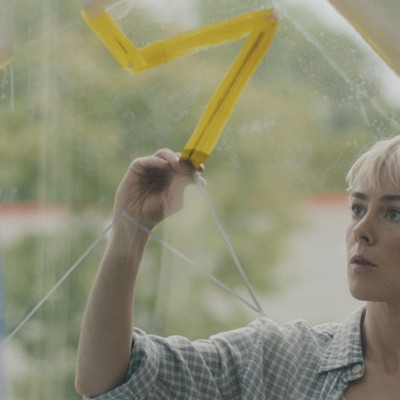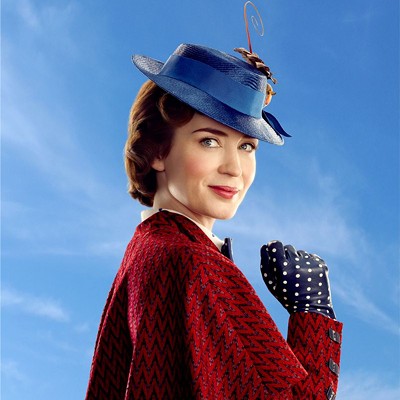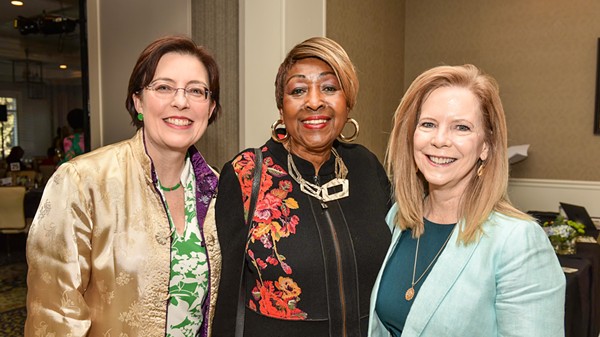THE DEVIL WEARS PRADA As Miranda Priestley, the ice-cold and rock-hard editor of the fashion magazine Runway, Meryl Streep speaks volumes with a quick glare here or a terse quip there. It’s a terrific comic performance, as rich as the ones she delivered in Postcards from the Edge and the otherwise unwatchable She-Devil. But let’s not undervalue Anne Hathaway’s contribution to the film. Hathaway (last seen in Brokeback Mountain) has the largest role as Andy Sachs, a college grad whose cluelessness about the fashion industry proves to be a drawback in her stint as Miranda’s worked-to-the-bone assistant. Hathaway is to Streep what Tom Cruise was to Dustin Hoffman in Rain Man -- a young talent carrying the load while allowing a more established star to shine in smaller doses -- and she works around her character’s predictable arc to allow Andy to come alive on screen as her own person. Other players likewise deserve kudos. Stanley Tucci, an actor with a tendency to ham it up, smoothly underplays the role of Nigel, Miranda’s most dependable employee. And British actress Emily Blunt, a relative newcomer, makes a striking impression as Emily, the perpetually stressed-out assistant whose entire life revolves around keeping Miranda happy. The film’s peeks into the fashion world are amusing, and the script makes some salient points about the lengths to which a person will allow themselves to be humiliated simply to hold onto a job. Once the focus turns to Andy’s crisis of conscience, the picture loses some of its bite. But not Meryl, whose ferocious work continues to take a sizable chunk out of the couture culture.
SUPERMAN RETURNS Today, the 1978 film version of Superman (directed by Richard Donner) may look primitive to young eyes weaned on PlayStation 2 and new-and-improved Tolkien tales, but it still holds up beautifully, with dazzling special effects, plenty of heart and spunk, and career performances by Christopher Reeve and Margot Kidder. Director Bryan Singer, the X-Men and X2 helmer who jumped ship to steer this franchise, chose to take the road less traveled. His movie is neither a remake of the 1978 staple nor a direct repudiation of it; instead, he imagined Superman Returns as a continuation of the original saga. For fans of Donner’s ‘78 model, the pleasures begin immediately with a triple play. First, those cool opening credits are back. Second, they’re accompanied by the familiar chords of John Williams’ score (John Ottman receives credit for original music, but so much of Williams’ classic piece is employed that new themes were hardly needed). Finally, Singer made the decision to borrow 1978 footage of Marlon Brando as Jor-El (the Man of Steel’s father) and use it at the beginning of his new picture. Learning that scientists had discovered the remains of his home planet of Krypton, Kal-El (Superman’s birth name) went to check it out for himself, only coming back to our planet after a five-year hiatus. Once again donning his human disguise as bumbling news reporter Clark Kent, he’s able to get his old job back at the Daily Planet, but other chapters of his life have been radically affected. Lois Lane (Kate Bosworth), now a Pulitzer Prize-winning writer (for an essay titled “Why The World Doesn’t Need Superman”), has tried to suppress her love for Superman: Having moved forward, she now has a young son (Tristan Leabu) and a fiance (James Marsden). Meanwhile, Superman’s arch-nemesis Lex Luthor (Kevin Spacey) is back in play and has ideas on how to assert his authority through unusual real estate ventures while also acquiring a chunk of kryptonite to put the Man of Steel out of business. Singer has some problems with rhythm and pacing -- the 150-minute running time eventually makes its presence known, and the movie has at least one ending too many -- while Bosworth appears too young and delicate to be playing a tough, award-winning journalist. Yet in the central role, Routh manages to command our attention: He’s not nearly as memorable as Reeve, but he’s easily able to hop between his hunky Superman persona and his goofy Clark Kent shtick while making both characterizations believable. Spacey appears to be having a ball as Lex Luthor, and the movie’s flashes of nasty humor (including a startling yet hilarious gag involving a pair of pomeranians) generally can be found in scenes involving his character.
CLICK Adam Sandler earns his hefty paychecks for comedies like The Wedding Singer and the execrable Big Daddy, but he satisfies his thespian aspirations with films like Punch-Drunk Love and the underrated Spanglish. With Click, he attempts to have it both ways. Spending more time sucking up to his unctuous boss (David Hasselhoff) than bonding with his wife (Kate Beckinsale) and kids, Michael Newman (Sandler in familiar man-child mode) is so distracted that he can’t even keep track of the household remotes (he points the clicker at his TV and the garage door opens). Venturing into the “Beyond” section of Bed, Bath & Beyond, he stumbles upon eccentric employee Morty (Christopher Walken), who gives him a universal remote that allows him to program his life as well as his TV set: He can mute the dog’s barking, fast-forward through foreplay and even listen to audio commentary (provided by James Earl Jones) on past events in his life. For the first half of the film, this clever concept yields some genuine laughs but more often gets buried under the sort of adolescent humor that long ago became the actor’s calling card (how many times do we have to watch the family dog hump a stuffed animal?). Then the movie shifts its course dramatically: Morphing into an update of Frank Capra’s It’s a Wonderful Life, it chronicles how the remainder of Michael’s life becomes a human tragedy, as he’s unable to stop the remote from fast-forwarding through the years, ultimately leaving him with bitter memories and numerous regrets. The comedy isn’t as pointed as desired and the drama isn’t as maudlin as expected, yielding decidedly mixed results. Still, it should prove to be an acceptable DVD rental in about six months. If they can get James Earl Jones for the audio commentary, so much the better.
NACHO LIBRE For a movie that many people (including me) tagged as this summer’s off-the-beaten-path sleeper hit, Nacho Libre turns out to be a surprisingly mild affair, one of those films where the creative juices dried up at some point between conception and execution. The premise held promise: Nacho (Jack Black), the lowly cook at a Mexican monastery that doubles as a home for orphaned boys, realizes that becoming a Lucha Libre wrestler would not only earn him enough money to better take care of the lads under his watch, but it might also instill enough self-confidence so that he won’t remain tongue-tied around the lovely new nun (Penelope Cruz look-alike Ana de la Reguera). But because the monks frown upon wrestling, Nacho is forced to disguise himself by donning a mask. Writer-director Jared Hess (Napoleon Dynamite) and co-scripter Mike White (The School of Rock) serve up a few potent gags, but they’re spread mighty thin throughout the picture’s running time. The remainder of the film is split between the sort of scatological humor we can find anywhere else — See Jack Black break wind! See Jack Black sit on the toilet! See Jack Black smear animal excrement on someone’s face! — and lazy south-of-the-border caricatures that aren’t funny, are offensive or are offensively funny. After a while, this disappointing film just lays there, like a wrestler body-slammed one time too many.
THE LAKE HOUSE Sandra Bullock’s star-making performance in 1994’s fast and furious Speed rushed through auditoriums like a welcome breeze on a muggy summer day. But with the exception of those imbecilic Miss Congeniality comedies, it’s hard to recall a recent picture in which Bullock has been allowed to draw upon her natural charisma. On the other hand, Reeves in ‘94 was just emerging from a period in which his repeated miscasting in prestige pictures like Bram Stoker’s Dracula, Dangerous Liaisons and Much Ado About Nothing left critics and fellow actors scratching their heads as to his ability to repeatedly land such high-profile roles. Since then, he’s excelled in a handful of diverse roles: iconic in The Matrix, funny in Thumbsucker and, in his best work, disarmingly romantic as he woos Diane Keaton in Something’s Gotta Give. The Lake House, which brings the stars together for the first time since Speed, serves as an exclamation point to the evolution of their respective careers. Bullock plays Dr. Kate Forester, whose new position at a Chicago hospital convinces her to move into the city and leave behind the lake house she’s been renting. Before departing, she whips off a welcome note for the next tenant, who turns out to be an architect named Alex Wyler (Reeves). But Kate’s comments in the letter, concerning the condition of the house, don’t jibe with what Alex sees, so he writes her back to clarify. As the missives keep flying back and forth, both parties come to the startling realization that they’re actually corresponding over the years -- she’s writing and receiving his letters in 2006, he’s doing likewise in 2004 -- and that the lake house mailbox serves as the magic portal through which they’re able to communicate. The Lake House’s central idea could conceivably work under the right set of circumstances -- chief among them the presentation of two lovers whose ardor is so all-encompassing that we feel like we’ll die if they don’t end up in each other’s arms before the closing credits. But The Lake House doesn’t even begin to inspire that level of swoony romance on our parts. The blame begins with director Alejandro Agresti, whose principal concern was apparently making sure that cinematographer Alar Kivilo captured the right lighting for each shot. Yes, it’s all as pretty as a picture, only it’s the wrong type of picture -- we expect a motion picture, but we get a still life instead.
A PRAIRIE HOME COMPANION Robert Altman’s best film since the one-two punch of Short Cuts and The Player back in the early 1990s might at first glance seem like a minor work. For all its levity, the central theme focuses on the specter of Death -- how it hovers around us, how it haunts us, and how it can inform our every move. The movie chronicles the events that take place during the last broadcast of a popular radio show. The Axeman (Tommy Lee Jones), a corporate suit with no respect for history or tradition, has dropped by to make sure the closing goes according to plan. G.K. (Garrison Keillor), the program’s guiding light, takes it all in stride (“Every show is your last show; that’s my philosophy”), more concerned that all the talent is in place. And what talent! First, there are the singing sisters Yolanda and Rhonda Johnson (Meryl Streep and Lily Tomlin). Then there are the cowboys Dusty (Woody Harrelson) and Lefty (John C. Reilly), adept at crooning cowpoke tunes. Backstage, the characters are no less colorful. Guy Noir (Kevin Kline) handles security, though his bumbling manner recalls Inspector Clouseau more than it does Sam Spade. Yolanda’s daughter Lola (Lindsay Lohan) mopes around in the dressing room while Mom performs. And then there’s the mysterious lady (Virginia Madsen) who appears out of nowhere and hangs around for the rest of the show. When the radio performers are front and center, the movie is nothing less than a joyous celebration of both Americana and the arts. Streep (who sang to equally good effect in Postcards from the Edge) and Tomlin make a formidable duet, while Harrelson and Reilly break through any lingering melancholy with their steady stream of quips.
CARS For all its NASCAR trappings, Cars is ultimately a paean to Route 66. The cars are the characters -- no humans exist in this world -- and the most prominent vehicle is Lightning McQueen (voiced by Owen Wilson), a rookie sensation on the NASCAR circuit (the name is doubtless an homage to Steve McQueen, a real-life racing enthusiast). Lightning is cocky, conceited and convinced that he needs nobody’s help to make it to the top. Clearly, Lightning is due for a comeuppance even more than he’s due for an oil and filter change. On his way to California to prepare for a race against a grizzled veteran known as The King (Richard Petty) and a loudmouth called Chick Hicks (Michael Keaton), Lightning unexpectedly winds up in the town of Radiator Springs, a once-bustling Route 66 burg whose status rapidly collapsed once the freeway insured that all cross-country traffic would be diverted away from the town. He becomes acquainted with the locals, including Sally (Bonnie Hunt), a former big-city lawyer who prefers the simple life; Mater (Larry the Cable Guy), a good ole boy tow truck whose idea of a good time is tipping the sleeping tractors; and Doc Hudson (Paul Newman), a sage automobile who might be able to teach the young hothead a few things about winning.
THE BREAK-UP There’s a fine movie trapped inside The Break-Up, and it’s a shame that it couldn’t break free. Vince Vaughn and Jennifer Aniston play Gary and Brooke, whose initial meeting and courtship are dealt with during the opening credits. From there, an argument over a dinner party proves to be the catalyst for the pair deciding to call it quits. He’s a prick; she’s a saint. Why exactly would we have an interest in whether these two remain together? Simple answer: We don’t.
X-MEN: THE LAST STAND It’s a testament to the durability of the original comic created by Stan Lee and Jack Kirby that the movie survives this hostile takeover. A “cure” has been found for mutancy, leading to divergent viewpoints among those afflicted with extraordinary powers. Some, like X-Woman Storm (Halle Berry) and the villainous Magneto (Ian McKellen), don’t look at mutancy as a curse. Others see nothing wrong in desiring a life of normalcy; among those is Rogue (Anna Paquin), whose mere touch can kill anyone, even a boyfriend (Shawn Ashmore’s Iceman) with whom she can never enjoy even the most chaste of physical intimacy. Wolverine (Hugh Jackman) and Cyclops (James Marsden)? They don’t seem too preoccupied with the issue, since they’re both still reflecting on the death of Jean Grey (Famke Jansen), who sacrificed herself at the end of X2.
DA VINCI CODE No instant classic and it won’t sweep next year’s Academy Awards. Conversely, also not a turkey for the ages. Steered by his Apollo 13 direct or Ron Howard, Tom Hanks plays the central role of Robert Langdon, a Harvard symbologist whose book-signing stint in Paris is cut short when he’s summoned to the Louvre to hopefully shed light on the strange circumstances surrounding the murder of an elderly curator. What Langdon doesn’t initially know is that the detective on the case, the gruff Bezu Fache (French national treasure Jean Reno), is convinced that he’s the killer. With a police cryptologist named Sophie Neveu (Amelie’s Audrey Tautou) as his only ally, Langdon evades capture and begins a jaunt across France and, later, England in an attempt to solve an ancient mystery that, if revealed, could potentially spell the end of Christianity as we know it. Seeking guidance, Langdon and Sophie turn to British scholar Leigh Teabing (Ian McKellen, easily earning MVP honors) to fill in the missing pieces. ƒç
OVER THE HEDGE Yet another charmless animated feature made by profiteers whose historical reference point seems to begin and end with Shrek. In other words, don’t look for what was once quaintly referred to as “Disney magic,” that timeless, ethereal quality that used to be par for the course in toon flicks like Dumbo, 101 Dalmatians and, in more recent times, Beauty and the Beast. With rare exception, today’s cartoon characters aren’t allowed to be romantic or introspective or lovably quixotic -- usually, they’re too busy hyperventilating or passing gas or trying to find ways to screw over their fellow toons. Over the Hedge is more of the same, as an opportunistic raccoon (Bruce Willis), in hock to a grouchy grizzly (Nick Nolte), cons a group of peaceful forest denizens into helping him invade suburbia and steal the humans’ junk food.
POSEIDON The original Poseidon Adventure was one of the first disaster flicks and it arguably remains the best. The Oscar-winning visual effects hold up; the Oscar-winning song “The Morning After” does not. Come next spring, I doubt we’ll be similarly mentioning the new Poseidon and Oscars in the same sentence, since this is as forgettable as motion pictures can get.
M:i:III Look, I’m as sick of hearing about Tom Cruise’s offscreen nonsense as anyone else. But the great thing about the magic of the movies is that it immerses us in fantasy worlds that more often than not allow us to disengage from real-life baggage. In other words, Cruise is accomplished -- and canny -- enough to know that a well-oiled summer flick is just the item to make us all forgive him -- at least temporarily -- for his indiscretions. Yet the performance of note in Mission: Impossible III belongs to Philip Seymour Hoffman, fresh from winning an Oscar for last fall’s Capote.

























